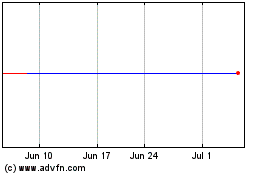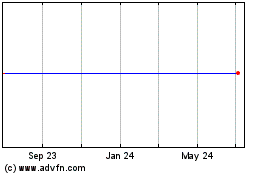Dell Sells $20 Billion of Secured Bonds
May 17 2016 - 1:30PM
Dow Jones News
Dell Inc. moved to finalize terms on $20 billion of secured
bonds Tuesday, according to people familiar with the matter, taking
a big step toward funding its blockbuster acquisition of EMC
Corp.
Despite concerns about Dell's long-term prospects as a computer
and data- storage company in a fast-changing tech landscape,
investors jumped at the rare chance to buy investment-grade bonds
with yields normally associated with junk-rated paper.
The final size of the deal is larger than the $16 billion that
Dell was originally planning, making it the fourth-largest bond
deal on record, according to Dealogic.
The investment-grade notes, which are spread across six tranches
of fixed-rate bonds with maturities ranging from three years to 30
years, will pay interest rates that are high relative to comparably
rated bonds but lower than initially offered Monday, after Dell's
underwriters received a flood of orders from investors.
A $4.5 billion, 10-year bond is poised to price with a yield
4.25 percentage points above Treasurys, or roughly 6%, compared
with the 6.5% offer Monday, people familiar with the matter said.
The average yield for comparable triple-B rated bonds was 3.58%
Monday, according to Barclays data.
Tuesday's bond offering doesn't end Dell's financing efforts. It
still needs to issue some other types of debt, including
approximately $3.25 billion of junk-rated, unsecured bonds. Before
its deal with EMC closes, it also needs to get approval from
Chinese regulators and EMC shareholders.
Acquiring EMC, a leading data-storage company with valuable
software holdings, is Dell's latest attempt to reshape its business
to make it less reliant on legacy hardware products, as spending
shifts from personal computers to mobile devices and from corporate
data centers to off-premise cloud services. The Round Rock, Texas,
company went private in 2013 partly in the hopes that it could
better plan for the future outside of the pressures of the public
markets.
As was the case with its leveraged buyout, Dell is again adding
a large amount of debt to its balance sheet but is hopeful that it
can quickly pay down a large portion of that debt with the cash it
generates from its still-lucrative businesses.
Given the poor state of the debt market earlier this year,
paying a 6% interest rate on 10-year bonds is far from the worst
possible outcome for Dell. Both investment-grade and junk-rated
corporate bonds have surged in recent months, as recession fears
have waned and the Federal Reserve has signaled that it isn't in a
hurry to raise interest rates.
Though investor appetite for riskier bonds has remained somewhat
volatile, investment-grade bond funds have experienced steady
inflows, as investors embrace securities that provide higher yields
than government bonds and less risk than junk bonds or
equities.
Last week, companies including AbbVie Inc. and Chevron Corp.
issued around $47 billion of investment-grade bonds, bringing the
year-to-date total to a record-setting pace of $506 billion,
according to LCD, a unit of S&P Global Market Intelligence.
Write to Sam Goldfarb at sam.goldfarb@wsj.com
(END) Dow Jones Newswires
May 17, 2016 13:15 ET (17:15 GMT)
Copyright (c) 2016 Dow Jones & Company, Inc.
Global X Funds (NYSE:EMC)
Historical Stock Chart
From Mar 2024 to Apr 2024

Global X Funds (NYSE:EMC)
Historical Stock Chart
From Apr 2023 to Apr 2024
